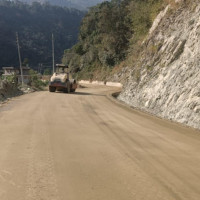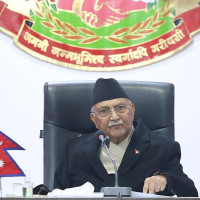- Friday, 7 February 2025
Khatiwada’s inspiring animal husbandry venture
By Laxman Kafle,Chitwan, July 8: Satisfied with the income he made from animal husbandry, Dinesh Khatiwada of Nijgadh, Bara, has expanded his animal farm by adding advanced breeds of cows and buffaloes.
Khatiwada, who has been in the field of animal husbandry since 2011, has expanded his business with the support of the Nepal Livestock Sector Innovation Project (NLSIP).
He first started rearing cows in Hetauda in 2011. But after he lost the election of ward chairman of Nijgadh Municipality in 2017, he moved to Chitwan and started rearing cows and buffaloes there commercially.
His farm ‘New Ratnanagar Agriculture Farm’ is now at Suryodaya of Ratnanagar Municipality-12, Chitwan.
Khatiwada said that he was encouraged to expand his farm by purchasing the improved breed of buffaloes and cows after he was selected for the NLSIP support.
He received a grant of Rs. 5 million from the NLSIP as per the agreement between the sub-project and NLSIP.
According to him, his investment in the farm has now reached around Rs. 25 million. The investment has increased more than the earlier estimated cost of Rs. 14 million while signing an agreement with NLSIP, he said.
There is a provision that the NLSIP should invest 50 per cent, banks and financial institutions 30 per cent while the remaining 20 per cent should be invested by the sub-project itself.
The NLSIP is a project of the Ministry of Agriculture and Livestock Development run with the support of concessional loans from the World Bank with the aim of increasing productivity in the selected livestock value chains, increasing the value of livestock products and strengthening the animal service sector of Nepal. After he got NLSIP support, Khatiwada has been rearing animals applying modern technique.
Daily 600 litres of milk production
Now his farm has over 135 cows, buffaloes and calves. Of them, 53 buffaloes and 18 cows are giving milk.
After receiving assistance from NLSIP, 15 cows and 15 buffaloes of the advanced breed have been added to the farm. Similarly, the improved sheds were constructed.
He said that he brought 10 buffaloes of the Nili-Ravi breed from Haryana, India. “Now, around 600 litres of milk is being produced daily,” he said.
He said that the milk is being sold in the local market. Buffalo milk is being sold at Rs.100 per litre and the cow milk at Rs. 90 per litre.
Breed important for milk production
According to him, various advanced breeds of cows and buffaloes are in the farm.
According to him, an advanced buffalo can give 24 liters of milk a day. An average of 20 liters of milk is being produced from the cattle reared on his farm. “I purchased a buffalo by investing Rs. 250,000 when I began buffalo rearing. The cost of buffalo of advanced breeding is high and general farmers cannot afford to buy one themselves,” he said.
He said that the government should make arrangements to provide the farmers with the advanced breed of buffaloes and cows at a cheaper rate.
Stating that the initiative taken by the government to bring buffaloes of Murrah breed is positive, he said that debating in the Parliament about bringing buffaloes of that breed from India was meaningless.
He said that the government should make it easier not only to make the country self-reliant in milk production but also to encourage youth in livestock.
“Many youths refused to take a career in agriculture, especially livestock, due to low income as they are compelled to rear local breeds of cows and buffaloes which give less milk than those of advanced breeds,” he said.
In the beginning, he started cow rearing in Hetauda, but he found it difficult to manage feed.
“Considering this, as per the provision of NLSIP, I focused on animal feed to increase the productivity, and I planted high-nutrition grass, including super napier, leasing 12 bighas of land,” he said.
Similarly, he also planted maize in around five bighas of land.
With the support of NLSIP, he has started using the machine for making silage for animal feed.
“As we have used nutrient grass for animals by reducing feed grain, the cost of production has decreased and the income of farmers has increased,” he said.
NLSIP fruitful for real individual, cooperatives, farmer group
Khatiwada said that the grant modality adopted by the NLSIP project is good for individual, cooperatives and farmers’ groups who really want to engage in livestock and contribute to economic development.
As per this provision, the beneficiary group should manage their own investment and take loans from banks and financial institutions which make them more accountable and responsible to recoup them from the income generated from the project, he said.
In agriculture, there are many subsidy programmes in the federal, provincial and local governments, but these programmes do not reach the actual farmers, he said.
But the beneficiary organisations of this programme have to invest first and claim for the subsidy later so that those who do not work do not participate in the project.
Sushil Khadka, an agricultural economist at the NLSIP, said that the subsidy will be provided based on the work completed as per the agreement signed between the sub-project and NLSIP.
“This project has become effective for the individual, cooperative and farmers group who really want to work in livestock and contribute to the nation,” he said.
The NLSIP is conducting sub-projects in 289 municipalities of 28 districts of five provinces of the country.
This project is conducting a subsidiary project by cooperating with the farmers in a cooperative/group or individual with the aim of making the country self-sufficient in the production of milk, goat meat and pashmina.

















